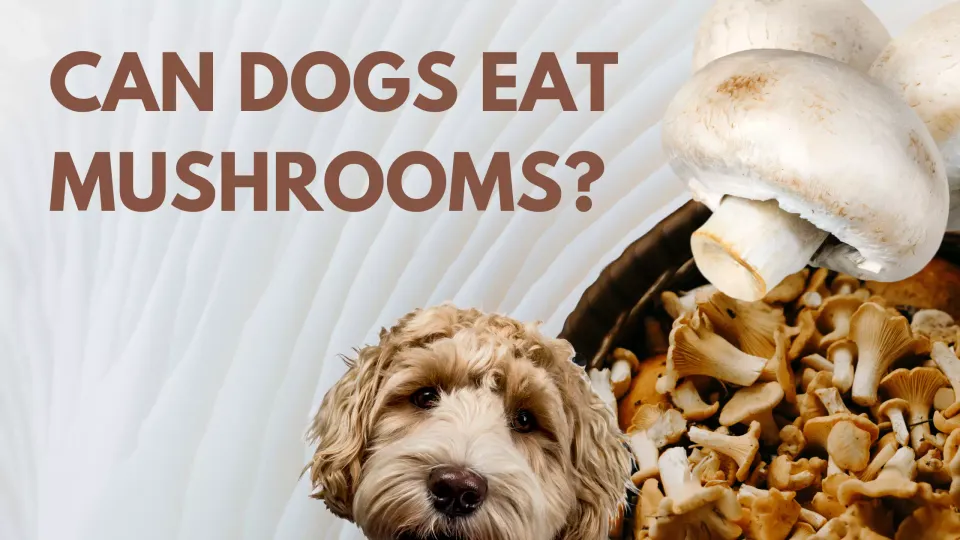Can Dogs Eat Mushrooms?

As our canine companions have evolved, so has their diet. Dogs, originally domesticated from wolves, have gradually transitioned from strictly carnivorous diets to more omnivorous ones, much like their human counterparts. With this evolution, a key question that many pet owners now find themselves asking is, "Can dogs eat mushrooms?"
In this article, we will delve into the specifics of this question. We will explore whether mushrooms are poisonous to dogs if dogs can consume cooked mushrooms, and the steps to take if your dog ingests mushrooms from your yard.
Are Mushrooms Poisonous to Dogs?
Mushrooms, a species-rich kingdom of fungus, have varying effects on dogs depending largely on the type consumed. Many mushrooms are harmless to dogs; however, some species can be extremely toxic and potentially fatal.
To start, it's important to understand that not all mushrooms are created equal. The hundreds of mushroom species found in the world range from completely harmless to fatally toxic. Some, such as those commonly found in grocery stores like button mushrooms, cremini, and portobello, are generally safe for dogs to consume.
However, there exist mushroom species such as Amanita phalloides (also known as death caps), Amanita muscaria (fly agaric), and others in the Inocybe and Clitocybe genera that can cause life-threatening problems if ingested by your furry friend. These mushrooms contain toxins like amatoxins, muscarine, and isoxazole, which can lead to symptoms ranging from gastrointestinal upset to severe liver and kidney damage or even death. The threat is not restricted to any specific geographic area as toxic mushrooms can be found worldwide.
It is important to remember the number one rule of mushroom picking: if you are not 100% sure about the mushroom species, then it is probably fatally toxic.
Can Dogs Eat Cooked Mushrooms?
Dogs can indeed eat cooked mushrooms but with a caveat. The mushrooms must be non-toxic varieties like those typically used in cooking and found in your local grocery store. Cooked plain, without the addition of harmful substances like onions, garlic, or excessive salt, these mushrooms can be a safe and healthy treat for your dog.
Cooking these safe-to-eat mushrooms can enhance their digestibility for dogs. It breaks down the tough cell walls of the fungus, releasing the nutrients within and making them easier for your pet to digest. However, it's crucial to remember that preparation is key. Cook the mushrooms simply, without adding any spices or ingredients that could potentially harm your pet. A slice of cooked portobello or cremini can be a novel treat for your dog when prepared correctly.
What to Do if Your Dog Eats Mushrooms from the Yard?
With dogs being naturally curious creatures, it is not uncommon for them to take a bite out of something they find interesting in the yard, and that something could very well be a mushroom. If you find that your dog has ingested a mushroom from the yard, it's essential to act promptly due to the potential toxicity of some wild mushrooms.
Firstly, try to identify the mushroom. If possible, collect a sample, taking care to include all parts of the mushroom, such as the cap, stem, and any part of the root that may still be in the ground. Clear, close-up photos can also be beneficial. The goal is to help a professional identify the mushroom.
Secondly, contact your veterinarian immediately, even if your dog is not showing any signs of distress. It's crucial to remember that symptoms of mushroom poisoning in dogs can take several hours to manifest, and by the time symptoms do appear, it may be too late for effective treatment.
If your vet is unavailable, contact a local animal poison control center. If possible, provide them with the mushroom sample or photos to aid in the identification.
Wrapping Up
In conclusion, while dogs can eat certain types of mushrooms, particularly those that are commercially available and cooked without harmful additives, it is generally safer to prevent them from eating mushrooms unless you are certain about the type of mushroom and its safety. If your dog ingests a mushroom from your yard or during a walk, immediate veterinary attention is crucial due to the possible ingestion of toxic varieties. The key takeaway here is, when in doubt, always consult a professional. After all, the health and safety of our beloved pets are worth every precaution.
